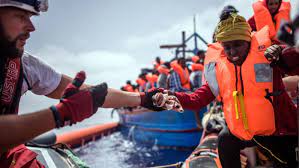The European Union wants to encourage Morocco to accept more migrants.
European interior ministers have visited Morocco in recent days to ask the kingdom’s authorities to cooperate more on migration issues.
These meetings are taking place at a time when Europe is facing the rise of the far right and the management of migratory flows is becoming a major concern.
The latest to arrive was Italian minister Matteo Piantedosi, who travelled to Rabat for talks with his Moroccan counterpart. They discussed the creation of a permanent joint commission to coordinate
efforts in the field of migration, as well as the fight against illegal trafficking and the improvement of legal migration channels.
Last April, French minister Gerald Darmanin and Belgian minister Anneliese Jean Louisa had already visited Morocco. They obtained commitments from the Moroccan government regarding the return of
irregular migrants.
In addition, German minister Nancy Visser signed agreements on so-called labour migration, excluding medical professions.
These visits confirm Europe’s efforts to encourage Morocco to take in more migrants, even if they are not from the country. Europe finds itself at an impasse between the expectations of voters who favour the far right and the needs of businesses that depend on foreign labour.
Morocco, for its part, imposes strict conditions and remains difficult to convince. The country enjoys a privileged status in the region when it comes to migration and refuses to be seen as a mere border buffer.
In May, the European Union adopted new directives on migration and asylum, allowing asylum seekers and migrants to be deported to third countries deemed safe. The Finnish Prime Minister mentioned Morocco and Albania as potential destinations.
Last year, the EU concluded an agreement with Tunisia, providing funds to prevent migrants crossing to Europe. However, there are reports that Tunisia is sending migrants back to other countries if they are
intercepted.
This complex situation underlines the need for close collaboration between Europe and its southern neighbours to effectively manage migratory flows while respecting human rights and guaranteeing
regional security.
MN/te/fss/as/APA


